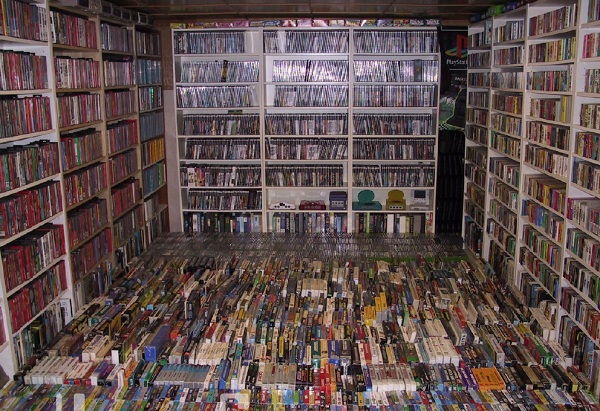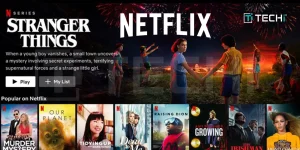A few years ago, iTunes seemed like the future. In fact, in a sense, it
was the future we’d all been promised.
Here, finally, was a digital business that worked! The music labels, film studios and TV stations were on board. Selection was good. Sure it was closed, but everyone and their mother had an iPod or, later, an iPhone or iPad. This was the dream of ‘digital content’ realized.
Trouble is, iTunes and other services like it are starting to feel a bit quaint. Don’t get me wrong: for what they are, they still work beautifully (well, the service I mean, not the software), and the selection on iTunes is unmatched when compared to similar businesses like Xbox Live or the Playstation Store. It’s just that iTunes’ “a la carte” business model – in which you pay a set amount for an individual piece of content – is starting to seem… old. Obsolete. And somehow just not in tune with the way web works.
It sounds almost paradoxical, but the culture of the web is making the current iTunes business model seem obsolete.
The Problems with A La Carte

A few months ago here on Techi, I wrote about how the issue of ‘piracy’ wasn’t so much about theft or entitlement,
but was about a cultural change. It’s that same cultural change that is making iTunes and other a la carte models obsolete.
The gist of it was this: once people have experienced what it’s like to download a ton of content from all over the place, asking them to go back to DRM-laden content that you pay for piece by piece seems strange and backward. Though it seems perfectly logical to ask people to pay for content they wanted, some cultural shift has made this seem unpalatable. But what?
Well, my theory is that it’s the effect of the web initiating a move from the economics of scarcity to the economics of abundance. Users know that, once the initial costs of creation are done, producing a new copy of a digital object costs almost nothing. This is why it’s so easy to find pirated material anywhere; you just click and download yet another copy. In fact, copying is sort of the basic way the web functions.
So this has fostered what you might call a ‘buffet mentality’ in people. Pay for your internet connection and download all you want. Digital has changed what was once an unchangeable truth – business is about exchanging money for a product – into something a lot more murky and confusing. Content is easily reproducible, and people treat it that way. So instead of paying for the content, you have to pay for something else. Usually something that, unlike the digital object, is scarce, like a live performance of an album. But what’s clear is that thing have irrevocably shifted.
How the Web Has Legitimately Gone ‘All You Can Eat’
So, many people’s experience with an ‘all you can eat’ approach to content came through piracy or copyright infringement. But that’s changed. Now, there are totally legitimate ways to go all-you-can-eat – and they’re all free.
Using Hulu or the various TV network’s own sites, you can watch video for the next month and not even come close to running out of things to watch. You can use
Grooveshark,
Songza or YouTube to listen to music from now until the end of your life. You can read more magazine and newspaper articles than you could fit in ten lifetimes, and you have access to almost the classics written in English before 1900.
The web has
already gone all-you-can-eat. And in a sense, this is about how the web theoretically works – through creating infinite copies of something for almost no cost – made manifest.
Of course, a very, um,
minor problem is this: if people have gotten used to this content buffet, how does anyone make money? Sure, making digital copies is almost free; but making the first copy definitely isn’t. Film and TV still require cameras, crews, actors and scripts. Music still needs recording studios and marketing.
So what do you do?
Why Subscriptions Are The Future

The word ‘subscriptions’ has always carried a negative vibe in the tech world, mainly because it always meant something like ‘renting’. Early subscription services like
Rhapsody filled devices with content that disappeared after your subscription was up. Not exactly a great thing for people who like building a music or movie collection.
But subscriptions can work, and there are two great examples: Netflix streaming and eMusic. They each work for different reasons – and they each, in their own way, represent the future of the web, because they take the problem of how to monetize content and give it a digital solution.
See, the problem created by the ‘all-you-can-eat’ web is the
feeling of limitless choice it entails. It’s a bit like setting someone loose in the candy store and saying “Hey. Go nuts.”, and then, a bit later telling them to pay for each coke bottle and sour key. Chances are they’ll look at you funny.
What subscriptions do, however, is say this: pay us so many dollars a month, and you can take all the candy you want. This is what Netflix does. Rather than charging per movie as iTunes, PSN or On-Demand does, it simply asks for one fee per month and tells you to watch as much you like. You don’t get to keep those purchases, but because many people would rather rent older films and TV shows, this works. What it also does is successfully monetize the web’s all-you-can-eat model. It’s still selling content, but people are paying for it, largely because it finds a middle-ground between the old model of ‘paying for individual pieces of content’ and the web’s “free” (i.e. illegal) or ad-supported approach.
eMusic – the third largest digital music seller in the US – does something similar, but a bit different. Instead of a buffet, you instead pay a set amount for a certain number of songs per month that you keep (the music is all DRM-free MP3s). Again, what’s key here is that eMusic has built a business on the massive choice and selection offered by streaming sites, but letting you keep (comparatively) high quality digital files.
Subscriptions effectively “monetize the pipes”. Instead of shopping for individual things at a bunch of stores, subscription services make you pay road tolls on the way there and allow you consume large amounts of content. This isn’t simply about business models. It’s about how new business models will deal with the cultural changes created by the internet. Yes for now, iTunes and other services are doing okay (keep in mind that iTunes only just breaks even) but they may not continue to as a generation raised on the web starts to come of age. Now that the web has popularized the all-you-can-eat approach, rather than trying to put everything back into Pandora’s box, it’s time to deal with that reality and find ways to make money off the ‘buffet mentality’ that now pervades. Netflix and eMusic are two options. Apple’s acquisition of Lala suggests another is on the way.
What’s clear is that it isn’t just about content – it’s about convenience and value. Sure, torrenting is an easy way to get stuff, but it’s illegal and it’s often a hassle. Netflix trumps illicit streaming because it makes it easy, simple and neat to sit in front of your TV and watch a variety of content. eMusic tops torrenting albums because it makes music so easy to find, download and incorporate into your life. The lesson is clear: give people an easier, better way to ‘eat all that they can’ and they will sign up in droves. But what is also clear is that companies that try to hold on to a business model that is just like the physical one that came before it will start to fade.
After all, when you go to the candy store, which would you prefer: paying a set amount to eat all that you can? Or sit there, carefully choosing what you spend your pennies on, trying hard to forget that a better way exists?
Do subscriptions represent the future? Or is another model a better fit for distributing on the web? A few months ago here on Techi, I wrote about how the issue of ‘piracy’ wasn’t so much about theft or entitlement, but was about a cultural change. It’s that same cultural change that is making iTunes and other a la carte models obsolete.
The gist of it was this: once people have experienced what it’s like to download a ton of content from all over the place, asking them to go back to DRM-laden content that you pay for piece by piece seems strange and backward. Though it seems perfectly logical to ask people to pay for content they wanted, some cultural shift has made this seem unpalatable. But what?
Well, my theory is that it’s the effect of the web initiating a move from the economics of scarcity to the economics of abundance. Users know that, once the initial costs of creation are done, producing a new copy of a digital object costs almost nothing. This is why it’s so easy to find pirated material anywhere; you just click and download yet another copy. In fact, copying is sort of the basic way the web functions.
So this has fostered what you might call a ‘buffet mentality’ in people. Pay for your internet connection and download all you want. Digital has changed what was once an unchangeable truth – business is about exchanging money for a product – into something a lot more murky and confusing. Content is easily reproducible, and people treat it that way. So instead of paying for the content, you have to pay for something else. Usually something that, unlike the digital object, is scarce, like a live performance of an album. But what’s clear is that thing have irrevocably shifted.
A few months ago here on Techi, I wrote about how the issue of ‘piracy’ wasn’t so much about theft or entitlement, but was about a cultural change. It’s that same cultural change that is making iTunes and other a la carte models obsolete.
The gist of it was this: once people have experienced what it’s like to download a ton of content from all over the place, asking them to go back to DRM-laden content that you pay for piece by piece seems strange and backward. Though it seems perfectly logical to ask people to pay for content they wanted, some cultural shift has made this seem unpalatable. But what?
Well, my theory is that it’s the effect of the web initiating a move from the economics of scarcity to the economics of abundance. Users know that, once the initial costs of creation are done, producing a new copy of a digital object costs almost nothing. This is why it’s so easy to find pirated material anywhere; you just click and download yet another copy. In fact, copying is sort of the basic way the web functions.
So this has fostered what you might call a ‘buffet mentality’ in people. Pay for your internet connection and download all you want. Digital has changed what was once an unchangeable truth – business is about exchanging money for a product – into something a lot more murky and confusing. Content is easily reproducible, and people treat it that way. So instead of paying for the content, you have to pay for something else. Usually something that, unlike the digital object, is scarce, like a live performance of an album. But what’s clear is that thing have irrevocably shifted.
 The word ‘subscriptions’ has always carried a negative vibe in the tech world, mainly because it always meant something like ‘renting’. Early subscription services like Rhapsody filled devices with content that disappeared after your subscription was up. Not exactly a great thing for people who like building a music or movie collection.
But subscriptions can work, and there are two great examples: Netflix streaming and eMusic. They each work for different reasons – and they each, in their own way, represent the future of the web, because they take the problem of how to monetize content and give it a digital solution.
See, the problem created by the ‘all-you-can-eat’ web is the feeling of limitless choice it entails. It’s a bit like setting someone loose in the candy store and saying “Hey. Go nuts.”, and then, a bit later telling them to pay for each coke bottle and sour key. Chances are they’ll look at you funny.
What subscriptions do, however, is say this: pay us so many dollars a month, and you can take all the candy you want. This is what Netflix does. Rather than charging per movie as iTunes, PSN or On-Demand does, it simply asks for one fee per month and tells you to watch as much you like. You don’t get to keep those purchases, but because many people would rather rent older films and TV shows, this works. What it also does is successfully monetize the web’s all-you-can-eat model. It’s still selling content, but people are paying for it, largely because it finds a middle-ground between the old model of ‘paying for individual pieces of content’ and the web’s “free” (i.e. illegal) or ad-supported approach.
eMusic – the third largest digital music seller in the US – does something similar, but a bit different. Instead of a buffet, you instead pay a set amount for a certain number of songs per month that you keep (the music is all DRM-free MP3s). Again, what’s key here is that eMusic has built a business on the massive choice and selection offered by streaming sites, but letting you keep (comparatively) high quality digital files.
Subscriptions effectively “monetize the pipes”. Instead of shopping for individual things at a bunch of stores, subscription services make you pay road tolls on the way there and allow you consume large amounts of content. This isn’t simply about business models. It’s about how new business models will deal with the cultural changes created by the internet. Yes for now, iTunes and other services are doing okay (keep in mind that iTunes only just breaks even) but they may not continue to as a generation raised on the web starts to come of age. Now that the web has popularized the all-you-can-eat approach, rather than trying to put everything back into Pandora’s box, it’s time to deal with that reality and find ways to make money off the ‘buffet mentality’ that now pervades. Netflix and eMusic are two options. Apple’s acquisition of Lala suggests another is on the way.
What’s clear is that it isn’t just about content – it’s about convenience and value. Sure, torrenting is an easy way to get stuff, but it’s illegal and it’s often a hassle. Netflix trumps illicit streaming because it makes it easy, simple and neat to sit in front of your TV and watch a variety of content. eMusic tops torrenting albums because it makes music so easy to find, download and incorporate into your life. The lesson is clear: give people an easier, better way to ‘eat all that they can’ and they will sign up in droves. But what is also clear is that companies that try to hold on to a business model that is just like the physical one that came before it will start to fade.
After all, when you go to the candy store, which would you prefer: paying a set amount to eat all that you can? Or sit there, carefully choosing what you spend your pennies on, trying hard to forget that a better way exists?
Do subscriptions represent the future? Or is another model a better fit for distributing on the web?
The word ‘subscriptions’ has always carried a negative vibe in the tech world, mainly because it always meant something like ‘renting’. Early subscription services like Rhapsody filled devices with content that disappeared after your subscription was up. Not exactly a great thing for people who like building a music or movie collection.
But subscriptions can work, and there are two great examples: Netflix streaming and eMusic. They each work for different reasons – and they each, in their own way, represent the future of the web, because they take the problem of how to monetize content and give it a digital solution.
See, the problem created by the ‘all-you-can-eat’ web is the feeling of limitless choice it entails. It’s a bit like setting someone loose in the candy store and saying “Hey. Go nuts.”, and then, a bit later telling them to pay for each coke bottle and sour key. Chances are they’ll look at you funny.
What subscriptions do, however, is say this: pay us so many dollars a month, and you can take all the candy you want. This is what Netflix does. Rather than charging per movie as iTunes, PSN or On-Demand does, it simply asks for one fee per month and tells you to watch as much you like. You don’t get to keep those purchases, but because many people would rather rent older films and TV shows, this works. What it also does is successfully monetize the web’s all-you-can-eat model. It’s still selling content, but people are paying for it, largely because it finds a middle-ground between the old model of ‘paying for individual pieces of content’ and the web’s “free” (i.e. illegal) or ad-supported approach.
eMusic – the third largest digital music seller in the US – does something similar, but a bit different. Instead of a buffet, you instead pay a set amount for a certain number of songs per month that you keep (the music is all DRM-free MP3s). Again, what’s key here is that eMusic has built a business on the massive choice and selection offered by streaming sites, but letting you keep (comparatively) high quality digital files.
Subscriptions effectively “monetize the pipes”. Instead of shopping for individual things at a bunch of stores, subscription services make you pay road tolls on the way there and allow you consume large amounts of content. This isn’t simply about business models. It’s about how new business models will deal with the cultural changes created by the internet. Yes for now, iTunes and other services are doing okay (keep in mind that iTunes only just breaks even) but they may not continue to as a generation raised on the web starts to come of age. Now that the web has popularized the all-you-can-eat approach, rather than trying to put everything back into Pandora’s box, it’s time to deal with that reality and find ways to make money off the ‘buffet mentality’ that now pervades. Netflix and eMusic are two options. Apple’s acquisition of Lala suggests another is on the way.
What’s clear is that it isn’t just about content – it’s about convenience and value. Sure, torrenting is an easy way to get stuff, but it’s illegal and it’s often a hassle. Netflix trumps illicit streaming because it makes it easy, simple and neat to sit in front of your TV and watch a variety of content. eMusic tops torrenting albums because it makes music so easy to find, download and incorporate into your life. The lesson is clear: give people an easier, better way to ‘eat all that they can’ and they will sign up in droves. But what is also clear is that companies that try to hold on to a business model that is just like the physical one that came before it will start to fade.
After all, when you go to the candy store, which would you prefer: paying a set amount to eat all that you can? Or sit there, carefully choosing what you spend your pennies on, trying hard to forget that a better way exists?
Do subscriptions represent the future? Or is another model a better fit for distributing on the web?




15 User Comments
Pete
What do you think about appstores, then? They don’t offer subscription model. Should they and would it work? What about ebooks?
navneetalang
Huh – thanks, Pete. That’s a really interesting point, and I one I hadn’t taken into account as much as I should.
Perhaps apps and media are two different animals? I guess what I’m thinking is that because apps are utilitarian – they are for doing some specific thing – it makes much more sense for them to be sold in an a la carte model. Since we consume media in part of entertain ourselves – and sometimes to edify ourselves – maybe that constant stream is better suited to an all-you-can-eat model or a set-amount subscription model?
Either way, thought-provoking point. Thanks very much for the comment.
Henrique
Well said! Thanks for a very interesting article…
Jake Rocheleau
Interesting ideas. I’d like to see a subscription-based web form within the next 2 years at most. I think there’s a huge market potential already forming
Jasper Kennis
Great article! Pretty thing is we knew this deep inside, but you said it in a way that that made me realize.
I wonder what would happen if Pirates Bay would start improving the experience and convenience of their services. In a way pirates are pushing progress the most, because it's them who make it impossible for conventional companies to keep on using their old business models.
Even Apple did make a small change to the "price per piece" model; you buy a licence, not the file. You can always download the files again later. They probably realized that it would be impossible to make people pay for a single file.
What if we could subscribe to the Pirates Bay, if they'd "stream" (who would care how the files got to you, as long as they'd arrive we'd be happy) whatever you needed to you trough a beautiful interface, preferable software associated to a subscription so that my phone, car and iPad know what I like to listen to too. It would be possible, via a wiki like network of administrators. That would give the companies you're giving credits a hard time. I'm curious what "solution" would be found than, what new business models would arise. Doesn't that make you feel like "upgrading" a pirate network;)
Jules
Sounds as disgusting as fat binge eaters.